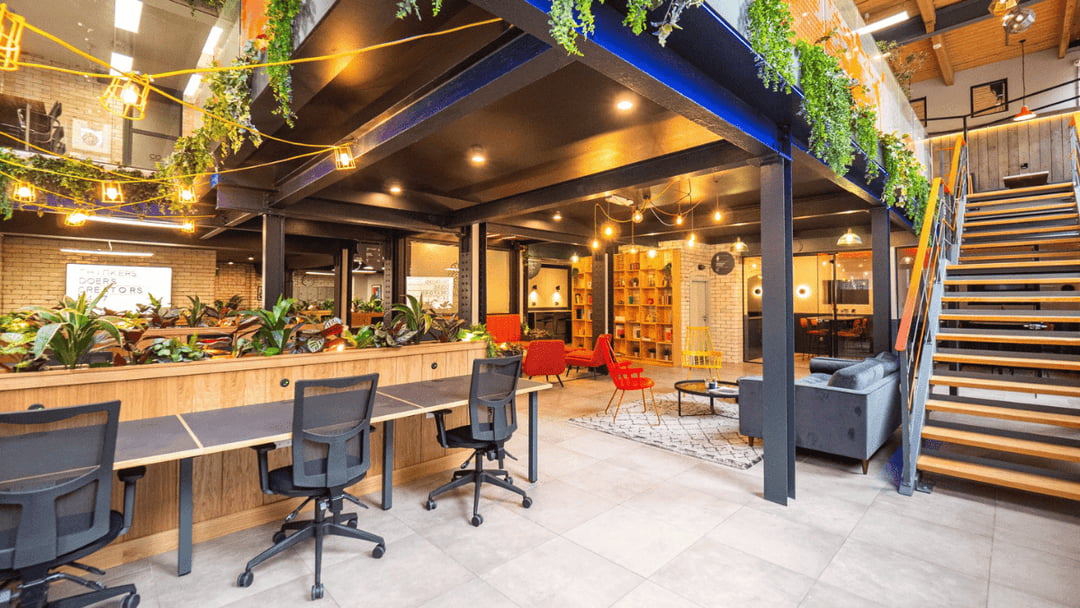
Back To Blogs
May 13, 2024
Joe Averill
6 minutes
Level Founder Joe Averill explores some of the key contemporary themes which businesses should know before they make the all important move…
Over the years drivers for making decisions on office space have changed significantly.
With that in mind lets run through some of the key factors driving decision making for businesses when they are selecting a new office for their team.
_____________
Firms are now aware of what they can get from wider aspects of their building which is driving their decision making. Put simply - they want more than an office. They want to know what else they can get from their building. Options now include gyms, cafés, content studios, additional meeting rooms, collaboration spaces, yoga and chill-out spaces, cinema rooms, event spaces, bike racks, shower rooms and more. Senior management across businesses want the best for their greatest asset - people. And they feel the right office environment is a fundamental factor in encouraging their teams back. Teams need the flexibility to work in the way they want to and it’s important that the building they choose facilitates this.
The performance of the large majority of businesses is reliant on the digital connectivity performance within the building, therefore it’s an essential part of the decision-making process when considering a new workspace.
You’d be surprised by the amount of times I have seen businesses in disputes with landlords regarding connectivity strength within a building. This is a key part of due diligence when searching for office space. Prop-tech business Wired Score rates buildings from Platinum through to Bronze on their digital connectivity resilience, giving you comfort when it comes to business-critical decision making.
The property sector is making positive changes however there is still a long way to go. Businesses are hiring more inclusively and buildings are being exposed for not being inclusive enough to cater for all. However there are a select few landlords and flex operators who have their finger on the pulse and are beginning to invest in more inclusive spaces. Businesses may have a range of requirements including disabled access, quiet spaces, neuro-diverse lighting, prayer rooms and range of food selection..
Are the landlords/operators client facing? Are they personable? What is their track record with customers? There are a number of landlords and flexible workspace operators who are getting it right at the moment. They are providing a notion of ‘more than workspace’. It’s evident to see in their ethos that they care about the businesses within their portfolio. When tenants are looking for a new office they want to know more detail about the landlord, their wider service offering and how they can impact their business performance – not just provide a space.
There are a large number of scaling firms currently looking for space to accommodate their growing teams and the right workspace decision is key so they do not frustrate their growth plans. Tech businesses for example will go through multiple fund raises (Seed, series A,B,C etc.) and subsequently boost people numbers. They will require a landlord with a proven track record of partnering with tenants to accommodate their growth. This is fundamental for fast growth businesses when making decisions on workspace. Landlords must understand how to structure deals commercially that appeal to fast growth tech businesses and deliver a plan centred on their growth plans.
Businesses are making value-based property decisions that align with their ethos. Value led businesses are highly conscious of their decision-making process when it comes to their next property to make sure their workspace is representative of their values. Therefore a number of firms look at a range of factors including the sustainability of buildings, health and wellbeing initiatives and building amenity.
The property sector is looking to address this with a variety of certifications to assess building performance. WELL certifications from the International WELL Building Institute (IWBI) encompasses a range of factors including; indoor air quality, water quality management, lighting measurements, thermal conditions, acoustic performance, environmental monitoring and occupant experience.
Further to this, the BREEAM method (Building Research Establishment Environmental Assessment Method) establishes which buildings are eco-friendly. These certifications assure businesses that they are choosing the right spaces for their people while also being reflective of their values. This is becoming increasingly important when businesses are choosing to make a move.
Additionally, businesses are now looking very closely at energy consumption due to rising prices. They want to know details on costs per KW/H before making that all important decision.
Want to find your next leased, managed or serviced office space to rent? Book a call with our team today.